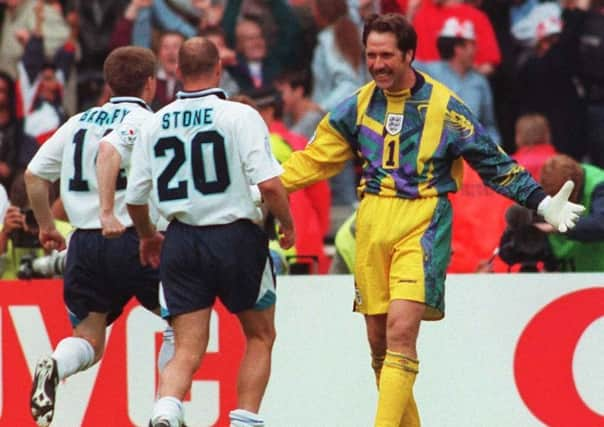From Gordon Banks to Jack Charlton, how Yorkshiremen have helped England reach 1,000 international matches


After The Wednesday forward John Clegg played in the Three Lions’ first international, a 0-0 draw in Scotland in 1872, he apparently complained that, “the southern snobs wouldn’t talk to him on the train up to Glasgow or pass to him out on the pitch!’”
Fortunately, the England team which will take to the Wembley pitch tonight for the country’s 1,000th international, a European Championship qualifier against Montenegro, has a much more inclusive feel. Even so, Yorkshire – like England – is still not punching its weight.
Advertisement
Hide AdAdvertisement
Hide AdClegg was not the only Sheffield-born player in the first line-up, but Rev Arnold Kirke Smith – who played for Scotland in the fixture before it had official status – had also been on the train a long time when he boarded. The reverend played for Oxford University, where he was a founder member of its football club.
Even 137 years on, a Yorkshireman’s best chance of wearing the Three Lions is to leave home.
Of the 1,244 players to have appeared for England, only 160 have done so while playing for Yorkshire clubs.
It was not even as if Clegg, who never again played for his country, was not sufficiently “establishment”, refereeing two FA Cup finals and some internationals before becoming chairman, then president, of the Football Association, Sheffield United and Wednesday. Like his younger brother William, a future mayor of Sheffield who played in England’s next match, he was knighted.
Advertisement
Hide AdAdvertisement
Hide AdFiercely opposed to professionalism, the solicitor was known as “the great old man of football” or “the Napoleon of football”, depending who you spoke to.
When Bramall Lane hosted a 3-2 defeat to Scotland in March 1883, it was the national team’s first visit to its biggest county. It has only been back 15 times since, also dropping in on Bradford Park Avenue, Ayresome Park, Leeds Road, Hillsborough, Elland Road and the Riverside.
Like every part of the country, Yorkshire can point to players who might have won more – or some – caps if only their face fitted. It surely counted against Middlesbrough’s Brian Clough, the greatest Englishman never to manage the team and the very definition of an outspoken Yorkshireman.
Sheffield’s Gordon Banks was the world’s greatest goalkeeper when England won their only major trophy, the 1966 World Cup.
Advertisement
Hide AdAdvertisement
Hide AdProtecting him were Huddersfield Town’s Ray Wilson and Leeds United’s Jack Charlton – proof, manager Sir Alf Ramsey once famously told him, that football was about having the best team, not necessarily the 11 best players.
When an England team widely regarded as better defended the trophy four years later, Charlton had made way but Castleford’s Terry Cooper replaced Wilson at left-back and his Leeds United team-mate Norman Hunter was a substitute. Had it not been for Banks’s food poisoning before the quarter-final with West Germany, England may have succeeded.
They would not have reached the Euro 96 semi-finals but for the heroics of Rotherham-born goalkeeper David Seaman, who Nicky Barmby played alongside when Sven Goran Eriksson’s side hammered Germany 5-1 in Munich.
They have been rare exceptions to the rule, though.
Oddly, management is one area where Yorkshire cannot claim to be under-represented. Of England’s 19 managers since the FA belatedly stopped picking its team by committee in 1946, Don Revie, Kevin Keegan, Steve McClaren and two-time caretaker Howard Wilkinson hailed from The Broad Acres. All but Keegan built their reputations here.
Advertisement
Hide AdAdvertisement
Hide AdTechnically, Watford-born Gareth Southgate is not a Yorkshireman, but having lived in Harrogate since 2001 he was officially adopted as one of our own last year.
Southgate understands his needs to be a team of all the nation’s talents, showcasing the diverse country it purports to represent. He realises what he calls “a brilliant county who love their sport” has something to contribute.
Yorkshiremen Kyle Walker, John Stones and Harry Maguire formed the back three on which England’s run to only their third World Cup semi-final was based last year. Walker is not part of tonight’s squad, but Danny Rose is, and until injury intervened, so was Fabian Delph. They, along with Sheffield’s Jamie Vardy, also played in Russia.
Sadly, something else Walker, Stones, Maguire, Rose, Delph and Vardy have in common is they had to leave their hometown clubs to prosper.
Advertisement
Hide AdAdvertisement
Hide AdFew events better highlighted Yorkshire’s rich sporting talent than the London 2012 Olympics, where we won seven gold medals, two silver and three bronzes, a tally bettered by only 11 countries.
It defies logic, then, that our football clubs have made so little impact on the Premier League. Late call-up Dean Henderson, a Cumbrian goalkeeper on loan at Sheffield United from Manchester United, is the only representative from Yorkshire’s 10 league teams. The Blades are flying the White Rose flag alone in the world’s most high-profile domestic Football League.
Sheffield Wednesday have provided England with more players (42) than any Yorkshire club, but none since Andy Hinchcliffe in 1998, and he joined them as a full international. Carlton Palmer was Wednesday’s last debutant, in 1992. That was when the last of Sheffield United’s 34 internationals to date, Brian Deane, won his final cap. Wilson remains Huddersfield’s last call-up, and despite Sir Alf’s back-handed compliment, Charlton is still Yorkshire football’s most-capped Englishman, with 35 appearances.
The old cricket maxim about a strong Yorkshire meaning a strong England does not apply to football, but a stronger Yorkshire scene could certainly help improve a record of 1,000 games and only one major trophy.